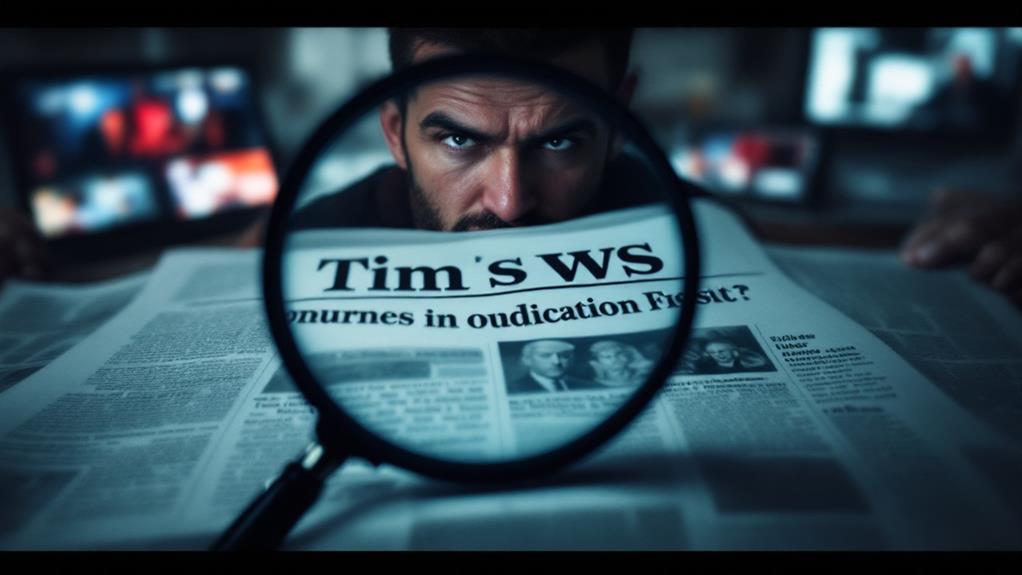What Are Examples of Skepticism?

You encounter skepticism daily, regardless of your questioning scientific hypotheses or evaluating the biases in news reports. It's also about scrutinizing consumer reviews to dodge misleading claims, verifying political statements across multiple sources, or doubting miracle health remedies and financial advice. Historian's skepticism includes questioning narratives and biases within historical accounts. In terms of technology, you're prompted to critically assess data privacy, AI biases, and ethical considerations. Practicing skepticism helps you make informed decisions, ensuring reliability and truth. By exploring further, you can hone your ability to think critically in different aspects of life.
Scientific Inquiry
Scientific inquiry often serves as a prime example of skepticism in action. When you're engaged in scientific pursuits, you're constantly questioning and challenging existing knowledge. Skepticism drives you to not just accept things at face value. Instead, you utilize experimental methods to test hypotheses rigorously. This process is vital because it guarantees that findings are based on evidence rather than assumptions or beliefs. It's significant to recognize that scientific claims are structured to be falsifiable, contrasting with pseudoscientific assertions that often evade rigorous testing. In hypothesis testing, you start by forming a question and predicting an outcome. Then, you design experiments to gather data that will either support or refute your hypothesis. It's all about being methodical and precise. You don't just gather evidence—you're actively seeking to disprove your own ideas. This way, you're more likely to arrive at findings that are robust and reliable.
Media Analysis

Just as skepticism plays a significant role in scientific inquiry, it's likewise important in media analysis. When you're consuming news, it's vital to question the information you're presented with. This aligns with the principles of epistemological skepticism that focus on the adequacy of knowledge in different fields. Media bias is a real issue that affects how stories are told. By recognizing potential biases, you can better understand the underlying perspectives and motives of the sources. Ask yourself if the outlet has a history of leaning towards certain political or ideological viewpoints. This awareness helps you evaluate the fairness and completeness of the narratives.
Information sourcing is another important aspect to scrutinize. Check where the media outlet is getting its information. Is it relying on credible, primary sources, or is it using second-hand reports and anonymous tips? Confirm the authenticity of the claims by cross-referencing with other reputable sources. This practice guarantees you're not misled by inaccurate or sensationalized reporting.
Being skeptical doesn't mean rejecting all media, but rather engaging with it thoughtfully and critically. By applying skepticism in media analysis, you empower yourself to distinguish between well-supported facts and potentially misleading information, thereby fostering a more informed understanding of the world around you.
Consumer Reviews

With regard to consumer reviews, approaching them with a healthy dose of skepticism can save you from potential disappointment. It's easy to get swayed by glowing recommendations and five-star ratings, but keep in mind that not all reviews are genuine. Fake reviews are prevalent, with some businesses hiring people to write positive feedback or even using bots to artificially inflate their ratings. These misleading tactics can trick you into purchasing subpar products or services.
When reading reviews, watch out for overly enthusiastic language that seems too good to be true. Biased testimonials often lack specific details and sound generic, as if the reviewer hasn't actually used the product. Check for patterns in the language used across multiple reviews; if they're suspiciously similar, they might not be authentic.
It's also helpful to take into account the volume of reviews. A sudden surge of perfect ratings could indicate a recent campaign to enhance a product's image rather than genuine customer satisfaction. Cross-referencing reviews from multiple websites or platforms can provide a more balanced perspective. By staying skeptical, you'll make more informed decisions, ultimately leading to better purchases and fewer regrets.
Political Critique

While skepticism is essential when evaluating consumer reviews, it's likewise significant in the domain of political critique. You must question the motives and actions of political figures to guarantee they adhere to political transparency. Often, leaders present policies or statements that sound beneficial, but without scrutiny, their true intentions could go unchecked. By questioning these narratives, you help maintain governance accountability, guaranteeing that leaders act in the public's best interests.
When a politician makes a promise or claims to have accomplished something significant, it's imperative to verify these statements. You can examine independent reports, check multiple news sources, and review official documents to get a clear picture. This skepticism helps prevent misinformation and holds those in power accountable.
Engaging in political critique isn't about cynicism or opposition for its own sake. Instead, it's about fostering a culture where leaders are transparent and responsible, and where citizens are informed and proactive. By doing so, you contribute to a healthy democracy where power is balanced, and the public's voice is heard. Remember, your skepticism serves as a tool to drive positive change and guarantee that political systems remain just and equitable.
Health and Wellness Doubts

Charting the world of health and wellness can be intimidating, especially with the overwhelming amount of information available. You're bombarded with dietary supplements promising miraculous results and alternative therapies claiming to cure everything under the sun. It's natural to feel skeptical. How can you tell which holistic practices truly benefit your well-being and which are just cash grabs?
Fad diets come and go, each one assuring you it's the shortcut to health and fitness, yet many lack scientific backing. When a new wellness trend emerges, it's easy to get swept up, but it's vital to question health claims that seem too good to be true. Fitness programs often advertise rapid transformations, but not all of them are sustainable or safe.
Detox products are another area where skepticism is warranted. They often promise to cleanse your body of toxins, yet your body already has a highly effective detox system—your liver and kidneys. Before investing your time and money, scrutinize the evidence behind these claims. By maintaining a healthy dose of skepticism, you're more likely to make informed decisions that genuinely support your health expedition.
Financial Decisions

When you're steering through financial decisions, it's easy to feel overwhelmed by the sheer volume of advice and options available. You might find yourself questioning which investment strategies truly align with your goals. It's natural to feel skeptical, especially when each advisor claims to have the perfect formula for success. You should approach these strategies with a critical mindset, evaluating who stands to benefit from your decisions.
Risk assessment is another area ripe for skepticism. You'll encounter many who downplay risks to make their investment strategies appear more enticing. It's essential to dig deeper and understand the potential downsides, not just the rosy forecasts. Ask yourself if the projected returns justify the risks you're considering. Remember, not all high-risk investments deliver high rewards.
Moreover, financial media often sensationalizes trends, pushing you toward decisions that might not suit your unique situation. Resist the urge to follow the crowd without proper research. Look for unbiased information and consider multiple perspectives before deciding. It's wise to question the motives behind the advice you receive. By maintaining a healthy level of skepticism, you'll make more informed and confident financial decisions.
Historical Investigation

Peering into history requires a skeptical eye and a curious mind. You need to question the narratives you encounter and dig deeper into the past. When you engage in historical investigation, it's vital to reflect on the historical context. Understanding the time period and the cultural, social, and political factors at play can provide you with insights that are significant for interpreting events accurately. You shouldn't take historical accounts at face value. Instead, scrutinize them, questioning who wrote them and why.
Evidence evaluation is an important skill in this process. You'll need to assess the reliability and bias of your sources. Look for primary sources, as they offer firsthand accounts, but remember they can still be biased. Compare different sources to identify discrepancies and commonalities. Don't just rely on popular history books; explore academic journals and original documents. As you piece together the evidence, remain open to the possibility that new information can shift your understanding. Practicing skepticism in historical investigation allows you to form a more nuanced view of the past, avoiding the pitfalls of oversimplification and misinformation.
Technological Advancements

In the domain of technological advancements, it is imperative to maintain a critical perspective even as we welcome new innovations. You might wonder how robot ethics play a significant role in this landscape. As robots become more integrated into daily life, questioning the moral implications of their actions and decisions is essential. Likewise, data privacy concerns soar as personal information is increasingly shared and stored online. It is important to ask how your data is being used and protected.
AI bias is another area that demands skepticism. Algorithms can unintentionally perpetuate existing prejudices, affecting everything from hiring practices to law enforcement. You should scrutinize how these systems are developed and implemented. The automation impact on jobs and the economy also warrants attention. While efficiency increases, consider the long-term effects on employment.
Tech addiction, fueled by social media and smart devices, raises questions about mental health and societal well-being. Digital surveillance poses further concerns, as constant monitoring infringes on personal freedoms. Finally, cybersecurity threats are ever-present, necessitating vigilance in protecting information from breaches. By questioning these elements, you can better navigate the challenges and opportunities technological advancements present.



